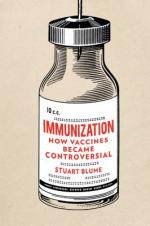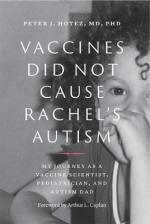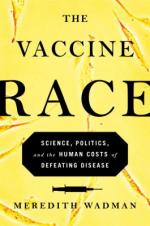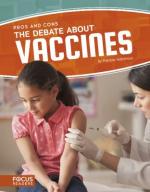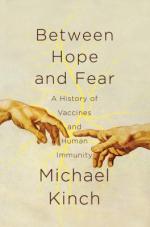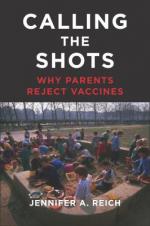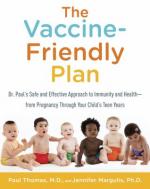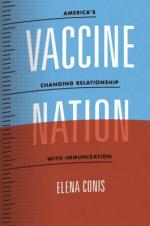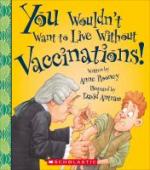February 21, 2019 | sobczakd
To vaccinate or not to vaccinate, that seems to be a controversial topic among parents. The state of Michigan requires schoolchildren to be immunized from 14 contagious diseases, but it also allows exemptions. Measles is an especially potent virus. According to the CDC, there's been 101 cases reported of a measles outbreak in 10 states. The CDC has a link to a fact sheet for parents called Diseases and the Vaccines that Prevent them. Want to know more? Here's some books to help separate fact from fiction.
One of the most important tools in the public health arsenal, vaccines are to thank for the global eradication of smallpox, and for allowing us to defeat the dire threat of infectious disease for more than one hundred years. Vaccine development is where scientists turn when faced with the frightening spread of new diseases like Zika, SARS, and Ebola. So if vaccines have proven to be such an effective tool, why are growing numbers of people questioning the wisdom of vaccinating children? Why have public-sector vaccine producers almost vanished? And can we trust the multinational corporations that increasingly dominate vaccine development and production? In this highly original and controversial new book, Stuart Blume argues that processes of globalization and unmet healthcare needs are eroding faith in the institutions producing and providing vaccines. He brings together short, readable histories of immunization practices over the past century, from the work of early pioneers such as Louis Pasteur and Robert Koch to the establishment of the World Health Organization and the introduction of genetic engineered vaccines. Focusing on today's "vaccine hesitancy," the book exposes the inadequacies of public health persuasion, and discusses what will be needed to restore parents' confidence. This is a timely history, one that not only sheds new light on the origins of our global vaccine crisis, but also points a way forward.
In 1994, Peter J. Hotez's nineteen-month-old daughter, Rachel, was diagnosed with autism. Dr. Hotez, a pediatrician-scientist who develops vaccines for neglected tropical diseases affecting the world's poorest people, became troubled by the decades-long rise of the influential anti-vaccine community and their inescapable narrative around childhood vaccines and autism. The alleged link between the two was first espoused in a fraudulent scientific paper, long since retracted, but the story shows no signs of letting up. As a result, we've seen deadly and disabling outbreaks of vaccine-preventable diseases around the country, and Texas, where Hotez lives, is at particular risk.
In Vaccines Did Not Cause Rachel's Autism, Hotez draws on his experiences as a pediatrician, vaccine scientist, and father of an autistic child. Outlining the arguments on both sides of the debate, he examines the science that refutes the concerns of the anti-vaccine movement, debunks current conspiracy theories alleging a cover-up by the CDC, and critiques the scientific community's failure to effectively communicate the facts about vaccines and autism to the general public, all while sharing his very personal story of raising a now-adult daughter with autism.
The epic and controversial story of a major breakthrough in cell biology that led to the conquest of rubella and other devastating diseases. Until the late 1960s, tens of thousands of American children suffered crippling birth defects if their mothers had been exposed to rubella, popularly known as German measles, while pregnant; there was no vaccine and little understanding of how the disease devastated fetuses. In June 1962, a young biologist in Philadelphia, using tissue extracted from an aborted fetus from Sweden, produced safe, clean cells that allowed the creation of vaccines against rubella and other common childhood diseases. Two years later, in the midst of a devastating German measles epidemic, his colleague developed the vaccine that would one day wipe out homegrown rubella. The rubella vaccine and others made with those fetal cells have protected more than 150 million people in the United States, the vast majority of them preschoolers. The new cells and the method of making them also led to vaccines that have protected billions of people around the world from polio, rabies, chicken pox, measles, hepatitis A, shingles and adenovirus.
Meredith Wadman's masterful account recovers not only the science of this urgent race, but also the political roadblocks that nearly stopped the scientists. She describes the terrible dilemmas of pregnant women exposed to German measles and recounts testing on infants, prisoners, orphans, and the intellectually disabled, which was common in the era. These events take place at the dawn of the battle over using human fetal tissue in research, during the arrival of big commerce in campus labs, and as huge changes take place in the laws and practices governing who "owns" research cells and the profits made from biological inventions. It is also the story of yet one more unrecognized woman whose cells have been used to save countless lives. With another frightening virus imperiling pregnant women on the rise today, no medical story could have more human drama, impact, or urgency today than The Vaccine Race.
Provides a thorough overview of the major pros and cons of vaccines. Readable text, interesting sidebars, and illuminating infographics invite readers to jump in and join the debate.
If you have a child in school, you may have heard stories of long-dormant diseases suddenly reappearing--cases of measles, mumps, rubella, and whooping cough cropping up everywhere from elementary schools to Ivy League universities because a select group of parents refuse to vaccinate their children. Between Hope and Fear tells the remarkable story of vaccine-preventable infectious diseases and their social and political implications. While detailing the history of vaccine invention, Kinch reveals the ominous reality that our victories against vaccine-preventable diseases are not permanent--and could easily be undone. In the tradition of John Barry's The Great Influenza and Siddhartha Mukherjee's The Emperor of All Maladies, Between Hope and Fear relates the remarkable intersection of science, technology and disease that has helped eradicate many of the deadliest plagues known to man.
A rich, multi-faceted examination into the attitudes and beliefs of parents who choose not to immunize their children. The measles outbreak at Disneyland in December 2014 spread to a half-dozen U.S. states and sickened 147 people. It is just one recent incident that the medical community blames on the nation's falling vaccination rates. Still, many parents continue to claim that the risks that vaccines pose to their children are far greater than their benefits. Given the research and the unanimity of opinion within the medical community, many ask how such parents--who are most likely to be white, college educated, and with a family income over $75,000--could hold such beliefs. For over a decade, Jennifer Reich has been studying the phenomenon of vaccine refusal from the perspectives of parents who distrust vaccines and the corporations that make them, as well as the health care providers and policy makers who see them as essential to ensuring community health. Reich reveals how parents who opt out of vaccinations see their decision: what they fear, what they hope to control, and what they believe is in their child's best interest. Based on interviews with parents who fully reject vaccines as well as those who believe in "slow vax," or altering the number of and time between vaccinations, the author provides a fascinating account of these parents' points of view.
Placing these stories in dialogue with those of pediatricians who see the devastation that can be caused by vaccine-preventable diseases and the policy makers who aim to create healthy communities, Calling the Shots offers a unique opportunity to understand the points of disagreement on what is best for children, communities, and public health, and the ways in which we can bridge these differences.
An accessible and reassuring guide to childhood health and immunity from a pediatrician who's both knowledgeable about the latest scientific research and respectful of a family's risk factors, health history, and concerns In The Vaccine-Friendly Plan, Paul Thomas, M.D., presents his proven approach to building immunity- a new protocol that limits a child's exposure to aluminum, mercury, and other neurotoxins while building overall good health. Based on the results from his pediatric practice of more than eleven thousand children, as well as data from other credible and scientifically minded medical doctors, Dr. Paul's vaccine-friendly protocol gives readers ? recommendations for a healthy pregnancy and childbirth ? vital information about what to expect at every well child visit from birth through adolescence ? a slower, evidence-based vaccine schedule that calls for only one aluminum-containing shot at a time ? important questions to ask about your child's first few weeks, first years, and beyond ? advice about how to talk to health care providers when you have concerns ? the risks associated with opting out of vaccinations ? a practical approach to common illnesses throughout the school years ? simple tips and tricks for healthy eating and toxin-free living at any age The Vaccine-Friendly Plan presents a new standard for pediatric care, giving parents peace of mind in raising happy, healthy children.
With employers offering free flu shots and pharmacies expanding into one-stop shops to prevent everything from shingles to tetanus, vaccines are ubiquitous in contemporary life. The past fifty years have witnessed an enormous upsurge in vaccines and immunization in the United States: American children now receive more vaccines than any previous generation, and laws requiring their immunization against a litany of diseases are standard. Yet, while vaccination rates have soared and cases of preventable infections have plummeted, an increasingly vocal cross section of Americans have questioned the safety and necessity of vaccines. In Vaccine Nation, Elena Conis explores this complicated history and its consequences for personal and public health. Vaccine Nation opens in the 1960s, when government scientists--triumphant following successes combating polio and smallpox--considered how the country might deploy new vaccines against what they called the "milder" diseases, including measles, mumps, and rubella. In the years that followed, Conis reveals, vaccines fundamentally changed how medical professionals, policy administrators, and ordinary Americans came to perceive the diseases they were designed to prevent. She brings this history up to the present with an insightful look at the past decade's controversy over the implementation of the Gardasil vaccine for HPV, which sparked extensive debate because of its focus on adolescent girls and young women. Through this and other examples, Conis demonstrates how the acceptance of vaccines and vaccination policies has been as contingent on political and social concerns as on scientific findings. By setting the complex story of American vaccination within the country's broader history, Vaccine Nation goes beyond the simple story of the triumph of science over disease and provides a new and perceptive account of the role of politics and social forces in medicine.
Sticking sharp needles into small children doesn't sound like a nice thing to do -- but sometimes you have to 'be cruel to be kind.' Since the 18th century, vaccinations have saved millions of people from deadly diseases. In the future, as new techniques are invented, we might even be able to give vaccines without the need for needles!

